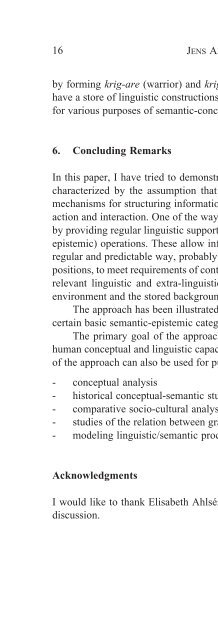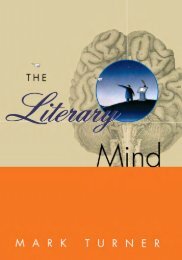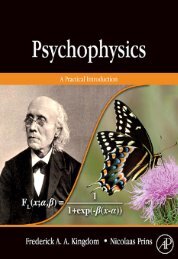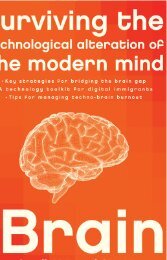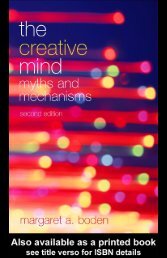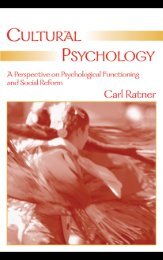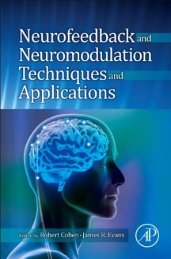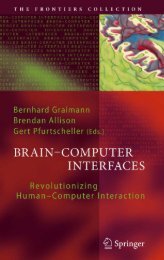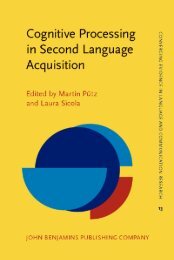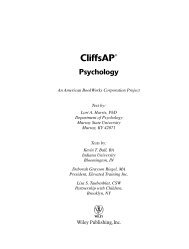Cognitive Semantics : Meaning and Cognition
Cognitive Semantics : Meaning and Cognition
Cognitive Semantics : Meaning and Cognition
You also want an ePaper? Increase the reach of your titles
YUMPU automatically turns print PDFs into web optimized ePapers that Google loves.
FUNCTION, COGNITION, AND LAYERED CLAUSE STRUCTURE 41<br />
in order to describe the skill. If we do that, all animals possess the concept<br />
“food”. Again, it may be regarded as merely a terminological issue — but<br />
there is a risk that discussion on human conceptualization will be muddled up<br />
by such a broad use.<br />
As an example, Langacker’s cognitive grammar (1987b, 1991) underst<strong>and</strong>s<br />
meaning in terms of conceptualization, providing a range of subtle <strong>and</strong><br />
convincing examples of how “objectivist semantics” is insufficient <strong>and</strong> human<br />
mental structures are necessary to underst<strong>and</strong> meaning. There is also a mental<br />
dimension with respect to speech sounds: it is not the physical sounds, but the<br />
way the human speaker organizes sounds that matter in linguistic structure.<br />
From this, Langacker concludes that the expression side of language is part of<br />
the semantic subdomain (1987b: 78–79): it deals with “sound concepts”, <strong>and</strong><br />
these are part of the general domain of conceptualization that constitutes the<br />
area of semantics.<br />
I think this is a case of the confusion I described above: if we have the<br />
word expression mother <strong>and</strong> the semantic content ‘mother’, we need a sense<br />
of the word “concept” according to which it is only the content side which<br />
involves a real concept. In the absence of such a sense, we cannot tell the<br />
difference between the expression <strong>and</strong> the content side of language: there is no<br />
reason why one concept is more contentful than the other. What is involved on<br />
the expression side, more specifically on the level of phonology, is the ability<br />
to make a certain range of perceptual distinctions as a precondition for<br />
reacting appropriately to them (as a moth can perceptually distinguish the<br />
clicks of a bat <strong>and</strong> react accordingly). Categorial perception is, of course, a<br />
distant relative of conceptualization proper, but the central theoretical basis of<br />
a semantic theory should not encompass both on an equal footing. The narrow<br />
sense I shall call “concept-cognitive”, <strong>and</strong> the broad sense “neuro-cognitive”.<br />
4. Functional <strong>and</strong> cognitive perspectives on meaning<br />
Linguistic meaning has always been understood primarily in conceptual<br />
terms, apart from the time of the invasion of formal logic in linguistics from<br />
the 1970s onward. In seeing linguistic meaning in terms of conceptualization,<br />
cognitive linguistics therefore has tradition on its side (cf. also Geeraerts<br />
1992). And with respect to the types of meaning that everybody considers<br />
basic, I think this tradition is wholly sound: the feature of human language


